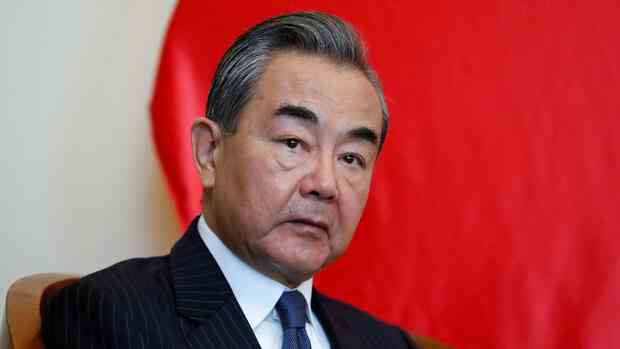Berlin, Beijing While US President Joe Biden underlined the close support for Ukraine with a visit to Kiev on Monday, China’s leading foreign policy leader Wang Yi was expected in Moscow on Monday. According to political observers, it is likely that possible peace talks between Moscow and Kiev will also be discussed during the stay.
During his visit, Wang Yi could also meet Russia’s head of state Vladimir Putin, said Kremlin spokesman Dmitriv Peskov. The Foreign Ministry in Beijing declined to comment further.
The secrecy fits Wang Yi’s previous appearance on his European tour, which has taken him to France, Italy, Germany and Hungary. After visiting Budapest, Wang Yi said on Monday that China wants to work with Hungary to find a peace solution to the Ukraine war. At the Munich Security Conference on Saturday, he surprised everyone by announcing a plan for a “political solution to the Ukraine crisis”.
Western experts, however, do not believe the role of the Chinese government as a neutral mediator because of its pro-Russian stance. In addition to Beijing’s verbal and economic support for Moscow since the beginning of the war, indications had already been made public in the days before that Chinese companies were increasingly supplying so-called dual-use goods to Russia, which were probably used there for military purposes.
US Secretary of State Antony Blinken said on Sunday that according to information from the US, the People’s Republic is also considering arms deliveries to Russia. Blinken warned Beijing of “serious consequences”.
The taboo of arms deliveries
In Brussels, Berlin and the other European capitals, people are looking very closely to see whether China is breaking the taboo on arms deliveries.
The great concern of Europe and the USA that China could also support Russia militarily was also an issue during the bilateral talks between EU chief diplomat Josep Borrell, Federal Chancellor Olaf Scholz and German Foreign Minister Annalena Baerbock with Wang Yi at the weekend on the sidelines of the Munich Security Conference. It was made clear to China that arming the Kremlin forces would represent a “red line,” Borell said in Brussels on Monday.
No further details on the planned Chinese Ukraine position paper were announced on Monday either. This is apparently due to be unveiled on February 24, a year after the Russian invasion of Ukraine.
>> Read here: Munich Security Conference: “We know that Beijing is looking very closely at the price Russia is paying”
Political analyst Manoj Kewalramani of the Indian think tank Takshashila Institution stressed that he was surprised that Wang Yi didn’t justify China’s stance on the Russian invasion of Ukraine more at the security conference. One reason for this might be the announced paper.
While Wang Yi behaved as a dove of peace in the Ukraine conflict, he had reverted to the well-known role of wolf warrior vis-à-vis the USA. He described the launch of a suspected Chinese spy balloon over US territory as “absurd and hysterical”.
Already in the past, Wang, then still Minister of Foreign Affairs, was noticed with sharp words against the USA, but also against Japan. He is thus considered a pioneer of the so-called “wolf warrior diplomacy”. Named after an ultra-nationalist but hugely successful Chinese film series, it represents a distinctly confrontational style of diplomatic rhetoric aimed at countering criticism of China.
Shrill tones towards the USA
After the Russian attack on Ukraine, the tone towards the USA became even more shrill. Leading Chinese politicians repeatedly accuse the United States of having triggered the Ukraine war and of being “the biggest driver of the crisis”.
The Ukrainian Foreign Minister Dmytro Kuleba reacted correspondingly skeptically to the announcement of a Chinese solution proposal. As long as there are no concrete proposals on the table, there is no point in talking about them, he said.
>> Read here: US warns China’s top diplomat Wang Yi against supporting Russia
Observers believe that the Chinese government is also targeting the global South with its peace initiative. In the summer, China’s head of state and party leader Xi Jinping sent Wang Yi, then foreign minister, on a diplomatic charm offensive to more than 30 countries, particularly in Central and Southeast Asia, in order to win allies.
The failure of the West to persuade major emerging economies to join the sanctions was “literally a credit to China,” said Alicia Garcia-Herrero, chief Asia-Pacific economist at French investment bank Natixis, at the time.
Wang’s rapid political rise
The 69-year-old Wang Yi was rewarded for his political successes with a significant increase in power at the party congress in October. He rose to the Politburo of the Communist Party, whose 24 members determine the course of the country.
In December, he was appointed director of the Bureau of the Foreign Affairs Commission of the Communist Party of China (CCP) Central Committee, becoming China’s top foreign policymaker. In a speech at the time, he reiterated that Sino-Russian relations were “unshakeable.”
More on this: Stop Russia to deter China – What remains of the Munich Security Conference
